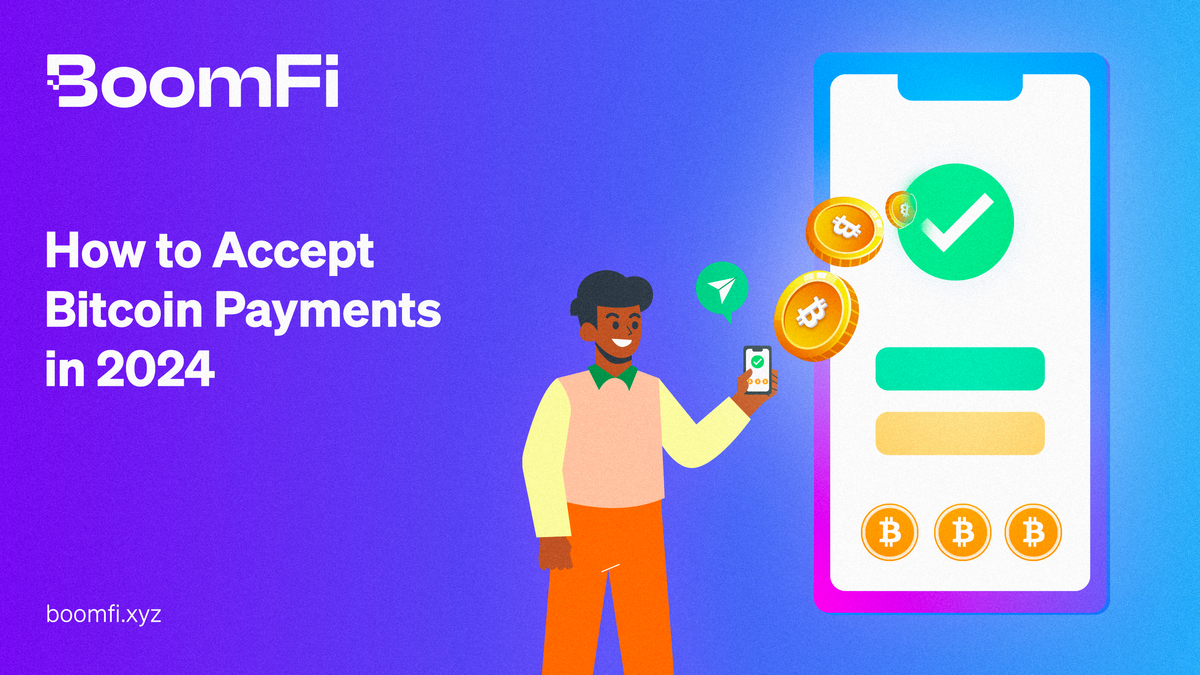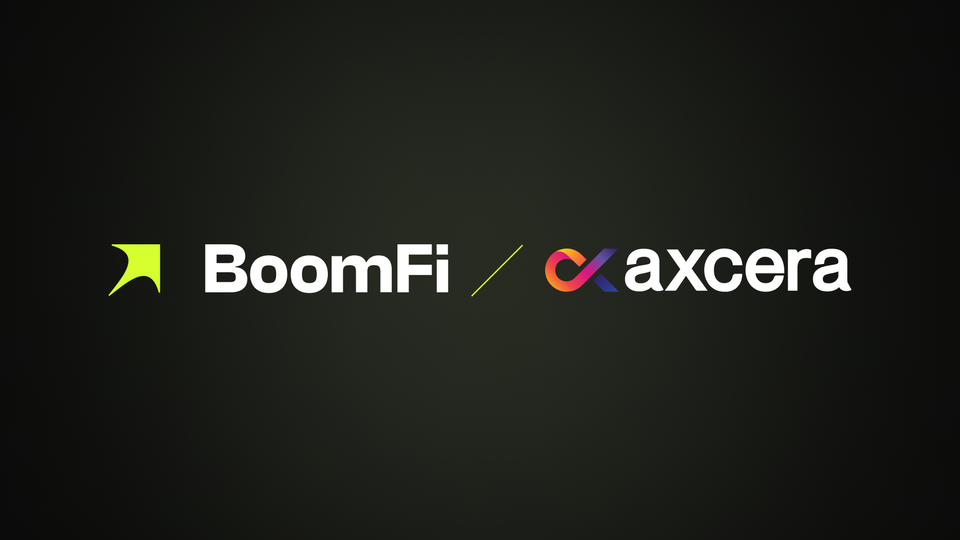How to Accept Bitcoin Payments in 2024: Step-by-Step Tutorial for Businesses
Learn the step-by-step process to accept Bitcoin payments for your business. Set up a wallet, choose a payment processor, and integrate with your website

What is the best way to accept Bitcoin payments?
Accepting Bitcoin payments can be a strategic move for businesses looking to embrace the growing popularity of cryptocurrencies. The best way to accept Bitcoin payments involves a systematic approach to ensure a seamless and secure transaction process. Begin by setting up a reputable Bitcoin wallet or utilizing a trusted payment processor such as BoomFi, Coinbase Commerce, or CoinGate. These platforms offer user-friendly interfaces, making it easy to generate payment buttons, and invoices, and integrate them with your existing checkout system. Communicate to your customers that Bitcoin is an accepted payment method on your website, and provide them with your Bitcoin address or a QR code. Consider leveraging plugins or integrations compatible with your e-commerce platform for a smoother setup. Additionally, stay informed about the evolving regulatory landscape surrounding cryptocurrencies in your region to ensure compliance. By adopting a reliable payment processor, promoting Bitcoin acceptance, and staying attuned to regulatory changes, businesses can effectively integrate Bitcoin payments into their operations.
How do merchants accept Bitcoin payments?
Merchants can easily accept Bitcoin payments by following these steps:
- Set Up a Bitcoin Wallet: Create a Bitcoin wallet, choosing from software, mobile, or hardware options.
- Choose a Payment Processor: Opt for a reputable payment processor like BoomFi, Coinbase Commerce, or CoinGate.
- Generate a Bitcoin Address or Payment Button: Create a unique Bitcoin address for receiving payments or use payment buttons provided by processors.
- Integrate with Website or POS System: Integrate Bitcoin payment options into the website or POS system using available plugins or APIs.
- Communicate Bitcoin Acceptance: Inform customers about Bitcoin acceptance on the website and at the checkout.
- Train Staff (for In-Person Transactions): If applicable, train staff to handle Bitcoin transactions at physical locations.
- Monitor and Adapt: Regularly monitor transactions and stay updated on cryptocurrency developments.
- Consider Incentives: Encourage Bitcoin use by offering incentives like discounts or exclusive deals. By following these streamlined steps, merchants can effortlessly incorporate Bitcoin payments, expanding their payment options and attracting a broader customer base.
Are there any risks associated with accepting Bitcoin payments?
While accepting Bitcoin payments offers various advantages, it's essential to be aware of potential risks:
- Volatility: Bitcoin prices can be highly volatile, leading to fluctuations in the value of received payments. Merchants may face challenges in pricing goods or services.
- Regulatory Changes: Cryptocurrency regulations are evolving, and changes in laws or government policies may impact the legality and taxation of Bitcoin transactions.
- Security Concerns: Although Bitcoin transactions are secure, the overall ecosystem is not immune to cyber threats. Merchants need robust security measures to protect against hacking or fraud.
- Market Adoption: Limited market adoption may restrict the number of customers willing to pay with Bitcoin. The target audience for cryptocurrency payments is still relatively niche.
- Transaction Reversibility: Unlike traditional payment methods, Bitcoin transactions are irreversible. Chargebacks or refunds can be challenging, and disputes may arise.
- Learning Curve: For both merchants and customers unfamiliar with cryptocurrencies, there may be a learning curve in understanding how Bitcoin transactions work, potentially leading to user errors. Despite these risks, many businesses successfully navigate the landscape by implementing proper risk management strategies, staying informed about regulatory changes, and utilizing secure payment processing systems.
What kind of security measures should I take when accepting Bitcoin payments?
When accepting Bitcoin payments, implementing robust security measures is crucial to safeguard your transactions and assets. Here are key security measures to consider:
- Secure Wallets: Use reputable and secure Bitcoin wallets for receiving and storing payments. Hardware wallets, which store private keys offline, offer enhanced security against online threats. For example, the Trezor Model T, providing maximum security with features like a touch screen, PIN code, and passphrase protection, Ledger Nano X can work with a range of platforms and Beginners can't go wrong with Exodus.
- Two-Factor Authentication (2FA): Enable 2FA on your wallet and payment processing accounts to add an extra layer of protection. This helps prevent unauthorized access even if login credentials are compromised.
- Regularly Update Software: Keep your wallet software, plugins, and any related applications up to date. Developers frequently release updates with security patches to address vulnerabilities.
- Use Payment Processors: Consider using reputable Bitcoin payment processors like BoomFi or Coinbase Commerce. These services handle transactions securely and can convert Bitcoin payments into local currency if needed.
- Educate Staff: Ensure that your team is educated about Bitcoin transactions and potential security threats. Training staff to recognize and respond to suspicious activity can mitigate risks.
- Secure Communication: Use secure communication channels when sharing Bitcoin addresses for transactions. Avoid public communication for sensitive information and prefer encrypted methods.
- Regular Audits: Conduct regular audits of your payment systems and associated security protocols. This helps identify and address vulnerabilities proactively.
- Backup Your Wallet: Regularly backup your wallet's important information, such as private keys and recovery phrases. Store backups securely offline to prevent data loss due to hardware failure or cyberattacks.
- Implement HTTPS: If you have an online store or payment gateway, ensure that your website uses HTTPS. Secure, encrypted connections protect user data during transactions.
- Customer Verification: Implement identity verification measures for high-value transactions to prevent fraudulent activities. This can include KYC (Know Your Customer) procedures. By adopting these security measures, you enhance the resilience of your Bitcoin payment infrastructure and build trust with customers, assuring them of a secure and reliable payment experience.
What are the fees associated with accepting Bitcoin payments?
When accepting Bitcoin payments, merchants may encounter various fees depending on the chosen payment method and service providers. Here's a breakdown of potential fees:
- Transaction Fees: Bitcoin transactions often involve a small network fee paid to miners to validate and confirm the transaction.
- Payment Processor Fees: If using a Bitcoin payment processor like BoomFi or Coinbase Commerce, merchants may incur processing fees, usually a percentage of the transaction amount.
- Conversion Fees: For merchants converting Bitcoin to fiat currency, additional fees may apply during the conversion process.
- Subscription Fees: Some Bitcoin payment services may charge merchants a subscription fee for access to advanced features or higher transaction volumes.
- Wallet Fees: Depending on the type of Bitcoin wallet used, there might be fees associated with transactions or wallet services.It's crucial for merchants to thoroughly understand the fee structures of their chosen payment methods and platforms to make informed decisions and accurately calculate the costs associated with Bitcoin transactions.
What is the best way to convert Bitcoin payments to fiat currency?
Converting Bitcoin payments to fiat currency involves several methods, and the choice depends on the merchant's preferences and requirements:
- Cryptocurrency Exchanges: Utilize cryptocurrency exchanges like Coinbase, Kraken, or Gemini to sell Bitcoin for fiat currency. The process involves creating an account, depositing Bitcoin, and executing a sell order.
- Payment Processors: Platforms such as BoomFi or Coinbase Commerce offer services to automatically convert received Bitcoin payments into fiat currency. Merchants can set up their preferences and receive settlements in their local currency.
- Over-the-Counter (OTC) Services: OTC services connect buyers and sellers directly for larger transactions. This method is suitable for merchants dealing with significant Bitcoin amounts and seeking personalized service.
- Peer-to-Peer (P2P) Transactions: Directly selling Bitcoin to individuals in exchange for cash or bank transfers is another option. This method provides flexibility but requires finding suitable buyers.
- Bitcoin ATMs: In regions with Bitcoin ATMs, merchants can use these machines to sell Bitcoin and receive cash. This option is convenient for immediate liquidity. Before choosing a method, merchants should consider factors like fees, processing times, and convenience. It's advisable to stay informed about local regulations regarding cryptocurrency conversions to ensure compliance.
Conclusion: Embracing the Future of Payments with Bitcoin and BoomFi
In conclusion, the shift towards accepting Bitcoin payments marks a significant stride into the digital era for businesses. As you navigate this landscape, selecting the right tools and partners becomes paramount. This is where a solution like BoomFi becomes invaluable.
BoomFi simplifies the intricacies of crypto transactions, offering a seamless bridge between traditional financial systems and the burgeoning world of digital currencies. Its diverse range of services, from payment processing to fiat-crypto exchanges, caters to the varied needs of modern businesses. By choosing BoomFi, you gain access to an all-in-one platform that supports over 100 currencies and stablecoins, along with innovative features like recurring crypto payments and gas-less transactions.
Furthermore, BoomFi's commitment to transparent and affordable pricing, coupled with its flexible integration options, makes it an attractive choice for businesses of all sizes. Whether you're a small enterprise or a large corporation, BoomFi's tailored solutions can help you seamlessly integrate Bitcoin payments into your business model.
As we embrace this digital shift, tools like BoomFi not only provide the necessary infrastructure but also ensure compliance, security, and ease of use. They stand at the forefront of this transition, guiding businesses through the complexities of cryptocurrency payments.
Ready to revolutionize your payment systems with Bitcoin and BoomFi? Visit BoomFi's website to explore their solutions and how they can benefit your business. Stay connected and informed about the latest developments in crypto payments by following BoomFi on LinkedIn, Twitter, and Telegram.
Embracing Bitcoin payments signifies more than just adopting a new payment method; it's about being part of a global shift towards a more inclusive and technologically advanced financial ecosystem. With the right approach and partners like BoomFi, your business can confidently step into this new era of digital transactions.

 Blog/How to Accept Bitcoin Payments in 2024: Step-by-Step Tutorial for Businesses
Blog/How to Accept Bitcoin Payments in 2024: Step-by-Step Tutorial for Businesses





